23 Culture Shock and Awe
Posted by Christine on Nov 24, 2014 in Ireland | 13 comments
Last month I was exchanging emails about this blog and other things with Craig Okino, a dear friend from college, when he learned I was returning from Dublin to Atlanta for six days to attend a wedding on November 1. “I’m curious to hear if you experience a little ‘culture shock’ upon your return to the US,” Craig wrote, “…the subject of your next blog, perhaps?” And in a subsequent message, “I’m very interested to hear what happens when you guys return to your old lives.”
Living in Hawaii and visiting the mainland every year, Craig knows a lot about culture shock. But while I said I’d give it a try, I wasn’t really sure I’d have enough to say when I got back to Dublin. I’ve only been living in Ireland for four months. No big deal. And I travel a fair amount, so I know there are always adjustments, big and small, when crossing borders, even local ones. I’ve been going back and forth to Ireland regularly for almost thirty years, so there won’t be any surprises, right?
Not so fast! Four months in residence is no two-week vacation, I soon realized. From the moment we landed in Atlanta, I felt caught between my two worlds—the sabbatical bubble in Dublin and the hive of activity surrounding my life in Atlanta. Remember the episode of Star Trek in which some of characters are in a speeded up universe, while the rest are in a parallel but slowed down one? To the slow people, the fast ones are only a buzz in the air, while the fast ones see the others moving almost imperceptibly in slow motion around them. Over that long weekend in Atlanta, I seemed to be negotiating both universes at the same time.
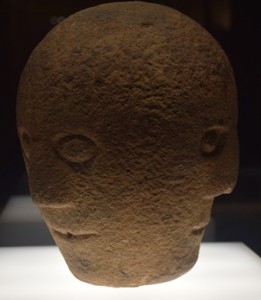
Three-faced carved stone head from the first or second century CE found in Co. Cavan, National Museum of Ireland
Committing to live somewhere for a year means you will open yourself more to life in that place than you might during a brief stay with the vacation spirit about it. To prepare for the year away, I made sure that I got out or rotated off of everything I was doing at home: the department chair’s job, committees, my seventeen year journal editorship, volunteer work at the kids’ former school, visiting lecturer gigs, and more. I traded a house in Atlanta for a small rental apartment in Dublin with minimal furnishings, where when something goes wrong, the landlord fixes it. I devised a sabbatical project that consolidated my interests and work in writing and in Irish literature, history, and landscape, so that instead of working on twenty things at once, I would have only one. I was going to do fewer things and do them in a more satisfying way—that was my promise to myself. But until we flew back to Atlanta, I didn’t really understand how successful I’d been in keeping that promise. Coming back to the place where my far busier life reigns was a shock, and I’m still in recovery.
When we landed at the airport, everything seemed so big! The buildings, housing developments, and highways. The airport itself, living up to its designation as the world’s busiest on that day. The people—they were both taller and wider than I was used to. We were happy to arrive home and be in our own house, happy to see our daughter Emma, and friends, colleagues, and students. But the house definitely loomed larger than I remembered, and the amount of stuff in it was overwhelming. Now with help from the family and in the wake of relatives’ possessions coming down to me over the years, I’ve collected all that stuff—I know what it all is, but why was there so much of it? I wandered from room to room looking helplessly at all the things I never used to notice. Who is this person, Christine in Atlanta? Why does she seem so alien to me? Even though I’m coming from a relatively prosperous country, later when I visited a CVS (supermarket style drugstore) and Lenox Shopping Mall that impression of absurd abundance and size continued to haunt me. International students coming to college often write about similar impressions of their first days or weeks in the US. The vastness of it all. Four months away is long enough to transform your frame of reference in this visceral, physical sense, apparently.
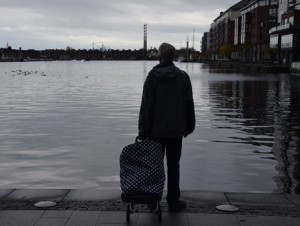
After arriving home in Dublin, shopping for groceries and saying hello to our favorite people, places, and views
The size and number of things surrounding me was astonishing, but that wasn’t the hard part. Wandering around our house, I kept encountering ghosts of things I meant to do or intended to do at some future date. The boxes full of family photos in my office: I was going to finish sorting them before I left and have them professionally scanned. The cushions for the deck furniture piled in our bedroom: what was my plan for them? A pile of letters, envelopes, forms, and sticky notes on my desk: correspondence I said I had to do before leaving for Dublin. Upstairs and downstairs I found stacks of books I had arranged in order of reading urgency along with files of half-promised writing projects, units I was going to develop for my courses, and loosely related items needing a permanent home. Every time I opened a drawer or a closet, out spilled reminders of unfinished jobs, or hints at what might have been. The kitchen—and several other rooms—needed painting, I now could see. It didn’t help that while we were there the upstairs heating system, the dishwasher, and a toilet all broke down. My own house seemed to berate me like an angry spouse: “And what about this? And this? And this?”
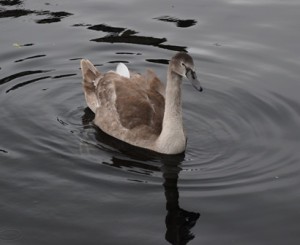
When we arrived in Dublin last June, this cygnet was just born. Now he or she is almost as big as the parents.
At Agnes Scott things seemed both reassuringly familiar yet eerily strange. After I left for Ireland in June, one of the main parts of my job, my beloved Center for Writing and Speaking, had actually moved across campus into very nice renovated offices in another building. I had seen the plans, weighed in on furniture, technology, color schemes, and floor plans, and I even worked with students to pack for the move. The last time I saw the new space it was a large, unpainted empty room with wires and cables hanging from the walls and ceilings. On my first morning back in Atlanta, I made my way to Campbell Hall and arrived at the big new glass doors, waving excitedly to everyone inside, only to discover that I was locked out—didn’t have the right ID to work the key card lock. That’s how I felt about just about everything during the visit, locked out with a glass wall standing between me and my life.
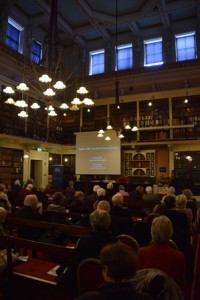
Attending a lecture on the Ordnance Survey mapping of Ireland in the 19th century at the Royal Irish Academy
Of course I had no time to really talk to anyone. I wonder if others saw the sense of helplessness and confusion I felt I was projecting as I said “hello” and tried to sum up the last four months in a few minutes? I did manage to have all too brief but good conversations with a few people and frantic “we’ll talk” exchanges with others (Keely! Phoebe! Julia!). But each conversation opened so many doors in my mind—things I was working on or needed to work on, problems I can’t solve, issues I can’t address from far away that will have to wait, sympathy or interest or support I should have expressed more clearly. It was hard to hear about problems and complexities and yet not be in the stream of conversation and solutions that will eventually solve them or sweep them appropriately aside. I probably came home worrying about things that others have already forgotten. There were people I wanted to see, needed to see, planned on seeing, but somehow missed (Susan! Esther!). And I swallowed a humbling dose of people who saw me but clearly didn’t remember I was gone and greeted me as if we’d seen each other yesterday. I loved all of these encounters, even the fleeting ones, and each one reminded me of the web of relationships that make Atlanta and Agnes Scott home. But, I came away feeling as if I’d cheated everyone of the attention he or she deserved, myself included.
The “shock” was not how different Ireland is from the US or vice versa—I’m used to the parallel universes of the two countries, though the size and abundance thing did hit me hard at first. The shock came from comparing the sabbatical life to the regular life, each one with its own purposes and advantages but worlds apart in their tenor and pace. The “awe” is that I’m so fortunate to have this opportunity to focus my efforts, live abroad, and chart the course of the year in ways that are incredibly self-fulfilling even if also a bit selfish. The “awe” is every precious moment in which I can do what I want to do for work and play in a place I love. I do miss the frenetic buzz and ridiculously complicated layers of life in Atlanta and at Agnes Scott, and the sadness of leaving Ireland next summer will be much assuaged by excitement about going back to all that.
Going back and forth through the looking glass rocked my mind, stirring turbulent eddies I hope I can turn into creative work, jarring some thoughts and decisions into place and opening others for future consideration. And though it was all in all a good thing to do, “jarring” is the word that sticks in my mind to describe my six days in Atlanta. I want this blog to be about Ireland and only secondarily about me, but Craig was right, culture shock was a subject I needed to address, though it came in a startlingly different guise than expected, which is why, I suppose, it’s called “shock.”

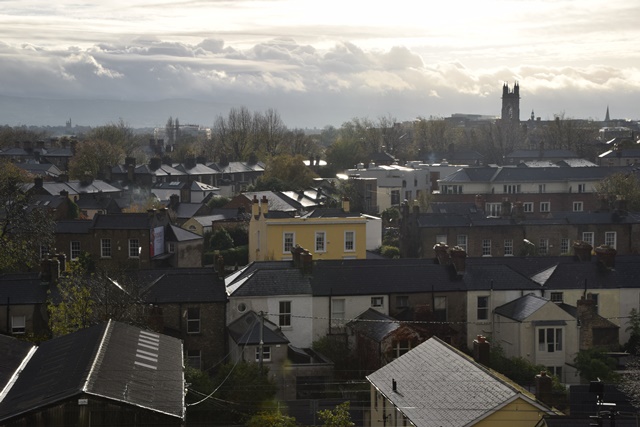
Shock and awesome! Last night makes more sense to me now.
Thank you for sharing your insight, Christine! Excellent writing that stirred me to tears.
Thank you for sharing. Chris. I read this blog because it IS about you, and it keeps you close whether you are in Dublin OR Atlanta. You interject so much of yourself in each piece; however, this one provided tremendous insight to what being on sabbatical is really like. Very well done.
Yes, yes, yes. The world of sabbatical, that sense of shedding the weight of unfinished things and focusing, only to find many of the unfinished things are still unfinished, waiting, upon return–I found it a shock even without travel. How can we bring those two parallel worlds closer together? Is that even a worthy goal? Thank you for sharing your insights!
A really great post!
If it helps at all, the ATL metro area has an economy not quite one and a half times the size of that of the country of Ireland, so sense of awe you describe is understandable.
Chris, I thoroughly enjoyed your writing! I was reminded several times of my own culture shock upon returning to the States after having lived in Italy for 2 years. The relative simplicity of my life there, though I was not on sabbatical, was in great contrast to the life I had led previously in San Francisco. Thank you for sharing your impressions. My best to you and Ron!
Thanks to Julie, Tom, Sandee, Michele, Dawn, and Ron for leaving comments! Great to know you are out there reading.
I really enjoyed reading this piece Dr.Cozzens! I have returned to Atlanta for almost 6 months now and have seen pictures of the new CWS but never got a chance to visit. I’m sure I’d be locked out as well. 🙂 Seeing interactions between CWS tutors on social media reminded me just how few international tutors we had at CWS when I first joined, and how many more devoted themselves to English Lit & Creative writing because of your support over years.
The piece also took me back to my own time abroad in Botswana, when I ditched my planner and let everything happen spontaneously. But just like you said, when I came back to U.S., all those unfinished tasks came back and my new planner hardly had enough space. But I had also came to realize I was privileged to be able to enjoy such time-off abroad, knowing I have the resource to come and go freely and means to sustain my desire to explore if I resume the fast-paced, task-filled life in the States or back home in China. But all in all, a great thought-provoking piece!
Shilin, So great to hear from you!Thank you so much for writing such a thoughtful comment. I hope I’ll get to see you in Atlanta when I return next summer. Please email me with your news!
I really admire and enjoy your writing skills. You make your experiences so relevant to all of us who take the USA for granted. Our life in England (91-92) seems almost dreamlike. Enjoy your time and we are looking forward to sharing time with you soon.
Thanks Jane! I’m really looking forward to touring Ireland with you and the rest of the family later this month.
Hi Dr. Cozzens!
Shilin told me about your blog last weekend when I stayed with her, and right now I’m typing this somewhere above the pacific ocean on my way home for Christmas break. I can really relate to this post as I try to visit home every year around this time, and end up experiencing culture shocks every single time both ways. At this point, I’m not really sure which shock is the “proper” shock and which one is the “reverse” shock!
Anyways, so glad to have found your blog! It was such an enjoyable read. Your English 200 remains one of my favorite classes from Agnes Scott, and I’ll definitely be mentioning it to prospective Scotties at a meet and greet this coming Saturday.
Happy Holidays!
Great to hear from! There are many versions of culture shock, aren’t there? I’m glad this take on the phenomenon resonated with you.